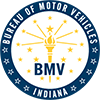Probationary Driver’s License is the term given to licenses issued to applicants who are younger than 21-years-old. Certain restrictions apply to these licenses and are in effect at various times until the driver’s 21st birthday (see restrictions below).
A probationary driver’s license expires 30 days following your 21st birthday. You may renew your probationary driver’s license after your 21st birthday, but not before.
Requirements for a Probationary Driver's License
To obtain a probationary driver's license, you must:
- Have held an Indiana learner's permit for 180 days (approximately six months), and
- Meet the age requirements:
- Be at least 16-years and 90-days-old (approximately 16 years and three months) with a successful completion of a Driver's Education program,
OR
- Be at least 16-years and 270-days-old (approximately 16 years and nine months) without successfully completing a Driver's Education program
- Be at least 16-years and 90-days-old (approximately 16 years and three months) with a successful completion of a Driver's Education program,
Not sure when you are age-eligible to apply for a Probationary Driver's License?
Apply for a Probationary Driver's License
To apply for a probationary driver’s license you must:
- Visit a license branch and present a signed Log of Supervised Driving and proof of successful completion of a driver education course (classroom instruction and behind-the-wheel training), if applicable,
AND - You must pass a vision screening test and a driving test (if the driver education provider does not offer a skills test waiver).
NOTE: A knowledge (written) test is also required if you have any points on your driver record.
If you are younger than 18-years-old when you apply for a driver's license, you must have a parent, legal guardian, or other adult who is willing to assume the obligations imposed sign an agreement of financial liability. The adult signing the agreement of financial liability must present documents of identification proving his or her identity and age.
Agreement of Financial Liability
Driver Education Waiver
- If you have a learner’s permit and are enrolled in an approved driver education program, you may take the driving test with your behind-the-wheel provider after your driver education program or when you apply for a probationary driver’s license at a branch.
You must take the driving test at a branch if any of the following situations occur:
- You receive a failing grade of 79 percent or below in either classroom instruction or behind-the-wheel training in your driver education program; or
- Your driver education behind-the-wheel provider cannot administer the driving test as part of the BMV’s driving skills test waiver program.
Restrictions on a Probationary Driver's License
Telecommunication devices
You may not use any type of telecommunication device while driving except to make emergency 911 calls.
Driving restrictions
You may not drive between 10 p.m. and 5 a.m. for 180 days after getting your license.
After you have driven for 180 days, and until you become 18 years of age, you may not drive during the following hours:
- Saturday and Sunday, between 1 a.m. and 5 a.m.
- Sunday through Thursday, after 11 p.m.
- Monday through Friday, before 5 a.m.
You may drive at any time if you are traveling to or from work, a school-sanctioned activity, or a religious event; or if you are accompanied by an individual in the front seat of the vehicle with valid driving privileges who is at least 25 years of age or a spouse with valid driving privileges at least 21 years of age.
Driving with passengers
You may not drive with passengers for 180 days after getting your probationary license, unless you are also accompanied in the front seat by a licensed instructor, an individual with a valid driver’s license who is at least 25 years of age or a spouse who is at least 21 years of age. You may transport your child, stepchild, sibling, step or half sibling or spouse during the hours allowed by law without another accompanying individual.
Court diversion programs
You will not qualify for court diversion programs.
